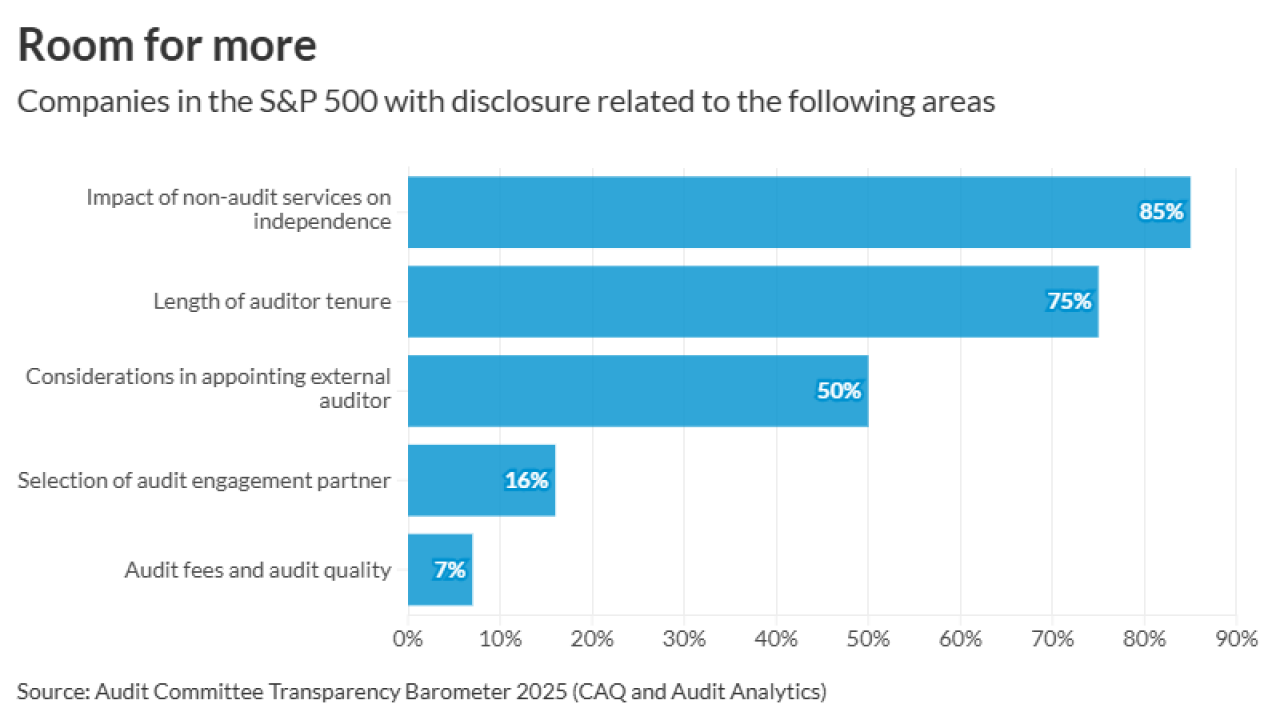The Financial Accounting Foundation’s board of trustees has voted to establish a new Private Company Council that will determine whether exceptions or modifications to U.S. GAAP for privately held companies are necessary.
The new council will replace the Private Company Financial Reporting Committee and will have the ability to identify, deliberate, and vote on any proposed changes, which will be subject to endorsement by the Financial Accounting Standards Board, which the FAF oversees, and be submitted for public comment before being incorporated into GAAP. The PCC will also serve as the primary advisory body to FASB on the appropriate treatment for private companies for items under active consideration on the FASB‟s technical agenda.
The new council comes in response to a report from a Blue-Ribbon Panel on Standard Setting for Private Companies that the FAF, the American Institute of CPAs and the National Association of State Boards of Accountancy set up in late 2009. The report they issued in January 2011 called for a separate standard-setting board to be set up under the auspices of the FAF. The FAF issued a proposal last October calling for the establishment of a Private Company Standards Improvement Council whose recommendations would still be subject to approval by FASB and would be chaired by a member of FASB (see
The AICPA said that proposal did not go far enough in separating the council from FASB control and organized a letter-writing campaign that generated thousands of comments to the FAF from CPAs. The AICPA even threatened to create its own standard-setting board (see
The revised proposal comes in response to some of those complaints, but still leaves accounting standards for private companies in the hands of FASB. Based on criteria mutually developed and agreed to with FASB, the Private Company Council will determine whether exceptions or modifications to existing nongovernmental U.S. GAAP are necessary to address the needs of users of private company financial statements.
“The trustees believe that the plan approved today will improve the standard-setting process and give private company stakeholders additional assurance that their concerns will be thoroughly considered and addressed,” said FAF Board of Trustees Chairman John J. Brennan following a meeting of the trustees in Washington, D.C. “This structure represents a significant improvement over our original proposal because of the very valuable suggestions we received from a broad cross section of concerned and interested constituents.”
“The plan approved by the Trustees strikes an important balance,” said FAF president and CEO Teresa S. Polley in a statement. “On one hand, the plan recognizes that the needs of public and private company financial statement users, preparers and auditors are not always aligned. But at the same time, the plan ensures comparability of financial reporting among disparate companies by putting in place a system for recognizing differences that will avoid creation of a ‘two-GAAP’ system.”
"The first thing is that we changed the name to the Private Company Council," Polley told Accounting Today (see
The private company plan approved Wednesday generally follows the outline of the initial trustee proposal announced last October, but includes several significant changes and improvements, the FAF noted. In response to stakeholder concerns, the trustees changed the process through which FASB considers Council recommendations for private company exceptions or modifications to GAAP from one of ratification to one of endorsement. The final plan stipulates that the Council chair will not be a FASB member; that the Council will hold meetings more frequently than originally proposed; and that its size will be smaller than initially suggested.
“The establishment of the PCC will help the FASB improve upon the efforts already under way to better serve the needs of private company financial statement users, preparers, and practitioners,” said FASB chairman Leslie F. Seidman.
Working jointly, the PCC and the FASB will mutually agree on criteria for determining whether and when exceptions or modifications to GAAP are warranted for private companies. Using the criteria, the PCC will determine which elements of existing GAAP to consider for possible exceptions or modifications by a vote of two-thirds of all sitting members, in consultation with the FASB and with input from stakeholders.
If endorsed by a simple majority of FASB members, the proposed exceptions or modifications to GAAP will be exposed for public comment. At the conclusion of the comment process, the PCC will redeliberate the proposed exceptions or modifications and forward them to the FASB, who will make a final decision on endorsement, generally within 60 days. If the FASB endorses the proposals, they will be incorporated into GAAP. If the FASB does not endorse, the FASB Chairman will provide the PCC Chair with a written explanation, including possible changes for the PCC to consider that could result in FASB endorsement.
The PCC will comprise 9 to 12 members, including a Chair, all of whom will be selected and appointed by the FAF Board of Trustees. The PCC Chair will not be a FASB member. Membership of the PCC will include a variety of users, preparers, and practitioners with substantial experience working with private companies. Members will be appointed for a three-year term and may be reappointed for an additional term of two years. Membership tenure may be staggered to establish an orderly rotation. The PCC Chair and members will serve without remuneration but will be reimbursed for expenses.
A FASB member will be assigned as a liaison to the PCC. FASB technical and administrative staff will be assigned to support and work closely with the PCC. Dedicated full-time employees will be supplemented with FASB staff with specific expertise, depending on the issues under consideration.
During its first three years of operation, the PCC will hold at least five meetings each year, with additional meetings if determined necessary by the PCC Chair. Deliberative meetings of the PCC will be open to the public, although the Council may hold closed educational and administrative sessions. Most of the meetings will be held at the FAF‟s offices in Norwalk, Connecticut, but up to two meetings each year may be held elsewhere. All FASB members will be expected to attend and participate in deliberative meetings of the PCC, but closed educational and administrative meetings may be held with or without the FASB.
The FAF Board of Trustees will create a special-purpose committee of Trustees, the Private Company Review Committee, which will have primary oversight responsibilities for the PCC. The Review Committee will hold both the PCC and the FASB accountable for achieving the objective of ensuring adequate consideration of private company issues in the standard-setting process. The Review Committee will be chaired by a Trustee with substantial experience in private company accounting issues. Oversight activities will be ongoing, and will include monitoring of PCC meetings, among other activities.
The PCC will provide quarterly written reports to the FAF Board of Trustees. The FAF Trustees will conduct an overall assessment of the PCC following its first three years of operation to determine whether its mission is being met and whether further changes to the standard-setting process for private companies are warranted.
The FAF said the complete report establishing the PCC, including background materials, key discussion issues considered by the Trustees, and PCC responsibilities and operating procedures, will be available on the FAF website next week. The FAF Board of Trustees will issue a call for nominations for members of the PCC via the FAF Web site in the next few weeks.
AICPA Reaction
The AICPA issued a statement of support for the new council on Wednesday shortly after the FAF trustees issued their announcement, indicating that it is mending its relationship with FASB and the FAF.
“With the news announced today by the FAF, we recognize and appreciate that the FAF has taken solid steps in the right direction regarding the Private Company Council,” said Melancon. “The AICPA is encouraged by this approach and awaits more of the details of the FAF decision. We look forward to continuing to work together to effect meaningful changes in U.S. GAAP for private companies and the users of their financial statements.”
The AICPA also announced plans Wednesday to develop an “other comprehensive basis of accounting” (OCBOA) financial reporting framework to meet the needs of some privately held small- and medium-sized enterprises (SMEs), as well as the users of the financial statements of these entities. The SME OCBOA framework will be a less complicated and a less costly alternative system of accounting to U.S. GAAP for SMEs that do not need U.S. GAAP financial statements.
“In addition to advocating for appropriate differences in U.S. GAAP to recognize the unique circumstances of the private company environment, we will be launching a complementary OCBOA financial reporting framework,” said Melancon. “The enhanced and simplified financial reporting framework will be a cost beneficial solution for smaller privately held entities that do not need to comply with U.S. GAAP.”
The FAF's Polley said she supports the AICPA plan to develop an OCBOA framework for smaller private companies and it would complement the new council's work.
Judy O'Dell, the chair of the Private Company Financial Reporting Committee, which the new council will replace, told Accounting Today last November that the AICPA should develop such a framework (see





